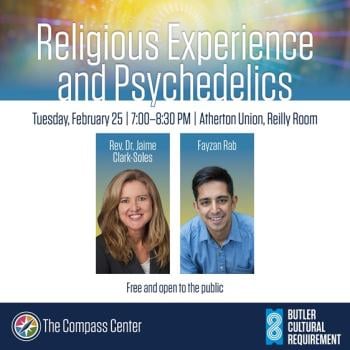The history of Russian Jewish emigration in the mid-1970s can be neatly summarized in a joke from the era: Two Jews are talking in the street, a third walks by and says to them, "I don't know what you're talking about but yes, it's time to get out of here!"
"I've known for a long time that my father wasn't able to pursue the career he wanted," Sergey tells me. As a young boy, though, Sergey had only a vague awareness of why his family wanted to leave their native Russia. He picked up the ugly details of the anti-Semitism they faced bit by bit years later, he says. Nevertheless, he sensed, early on, all of the things that he wasn't: He wasn't Russian. He wasn't welcome in his own country. He wasn't going to get a fair shake in advancing through its schools. Further complicating his understanding of his Jewish identity was the fact that, under the ardently atheist Soviet regime, there were few religious or cultural models of what being Jewish was. The negatives were all he had.
Sergey is too young to remember the day, in the summer of 1977, when his father came home and announced that it was time for the family to emigrate. "We cannot stay here any more," he told his wife and mother. He had arrived at his decision while attending a mathematics conference in Warsaw. For the first time, he had been able to mingle freely with colleagues from the United States, France, England, and Germany. Discovering that his intellectual brethren in the West "were not monsters," he listened as they described the opportunities and comforts of life beyond the Iron Curtain. "He said he wouldn't stay, now that he had seen what life could be about," says Genia.
The couple knew, of course, the perils of applying for an exit visa. They could easily end up refuseniks, unable to find work, shunned, in perpetual limbo. Nobody had promised Michael a position abroad but he was confident he could find work in the West that was intellectually stimulating and would support the family. Genia, however, was unconvinced. They had lived in Moscow their entire lives. They had decent jobs and a young son. Was it worth it to try to leave? "I didn't want to go," she says. "It took a while for me and his mother to agree. I had a lot more attachments." It was up to Michael to do the convincing. "I was the only one in the family who decided it was really important to leave -- not in some distant future," he says.
The Brins' story provides me with a clue to the origins of Sergey's entrepreneurial instincts. His parents, academics through and through, deny any role in forming their son's considerable business acumen -- "He did not learn it from us, absolutely not our area," Michael says. Yet Sergey's willingness to take risks, his sense of whom to trust and ask for help, his vision to see something better and the conviction to go after it -- these traits are evident in much of what Michael Brin did in circumventing the system and working twice as hard as others to earn his doctorate, then leave the Soviet Union.
For Genia, the decision ultimately came down to Sergey. While her husband admits he was thinking as much about his own future as his son's, for her, "it was 80/20 about Sergey." They formally applied for an exit visa in September 1978. Michael was promptly fired. Genia, who had obtained her job through a relative, had to quit to insulate him from any recrimination. "When he got a whiff of our intentions," she says, "he said ‘please get out of there as soon as possible.' It had to be a secret from everybody at work, my real reason for leaving. So I lied to all of my coworkers that I was simply leaving my job because I got another job, where I would only have to be at work three days a week and the salary would be higher. I made up -- totally made up -- the name of a place where I was planning to work." There was no other job, of course, and suddenly they found themselves with no income. To get by, Michael translated technical books into English, but it was painstaking work. He also began to teach himself computer programming, having no expectation of getting an academic position if they ever got out. When Genia found temporary work, again lying about her situation, they shared responsibility for looking after Sergey, who stayed at home rather than attend a miserable Soviet pre-school.
And then they waited.
For many Soviet Jews, exit visas never came. But, in May 1979, the Brins were granted papers to leave the U.S.S.R. "We hoped it would happen," Genia says, "but we were completely surprised by how quickly it did." The timing was fortuitous: They were among the last Jews allowed to leave until the Gorbachev era.
Sergey, who turned six that summer, remembers what followed as simply "unsettling" -- literally so. "We were in different places from day to day," he says. The journey was a blur. First Vienna, where the family was met by representatives of HIAS, the Hebrew Immigrant Aid Society, which helped thousands of Eastern European Jews establish new lives in the free world. Then, on to the suburbs of Paris, where Michael's "unofficial" Jewish Ph.D. advisor, Anatole Katok, had arranged a temporary research position for him at the Institut des Hautes Etudes Scientifiques. Katok, who had emigrated the year before with his family, looked after the Brins and paved the way for Michael to teach at Maryland.
When the family finally landed in America on October 25, they were met at New York's Kennedy Airport by friends from Moscow. Sergey's first memory of the United States was of sitting in the backseat of the car, amazed at all the giant automobiles on the highway as their hosts drove them home to Long Island.
The Brins found a house to rent in Maryland -- a simple, cinder-block structure in a lower-middle-class neighborhood not far from the university campus. With a $2,000 loan from the Jewish community, they bought a 1973 Ford Maverick. And, at Katok's suggestion, they enrolled Sergey in Paint Branch Montessori School in Adelphi, Maryland.
He struggled to adjust. Bright-eyed and bashful, with only a rudimentary knowledge of English, Sergey spoke with a heavy accent when he started school. "It was a difficult year for him, the first year," recalls Genia. "We were constantly discussing the fact we had been told that children are like sponges, that they immediately grasp the language and have no problem, and that wasn't the case."
- Trending:
- Pope Leo Xiv
- |
- Israel
- |
- Trump
- |
- Social Justice
- |
- Peace
- |
- Love
The Story of Sergey Brin
May 20, 2010
Page: 3 of 7
more at patheos




